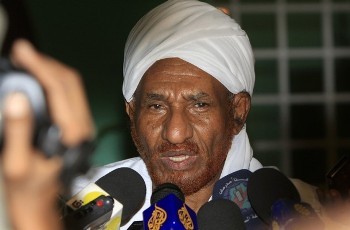Former Sudan PM slams parties critical of dialogue with NCP
July 26, 2011 (KHARTOUM) – The leader of Sudan’s National Umma Party (NUP) al-Sadiq al-Mahdi on Tuesday accused some opposition parties of seeking to leverage on a future popular uprising by the youth so that they can come to power.

He asserted that these political powers are also unwilling to mobilize their supporters yet are waiting on civilian and armed elements to push for change of the Sudanese regime which he described as one in “intensive care”.
However he warned that any military confrontation could lead to international intervention and that only a “national agenda” can avert this scenario.
The NUP chief was likely referring to the National Alliance Forces which is comprised of a handful of opposition parties but dominated by the Popular Congress Party (PCP) headed by Islamist leader Hassan al-Tuarbi. The coalition has clashed with the NUP over its dialogue with the ruling National Congress Party (NCP).
Al-Mahdi has consistently defended his position saying that his party was only negotiating over the “national agenda” specifying it to be a new constitution, a solution to the conflict in Darfur region, a remedy to economic malaises, a way out of the International Criminal Court’s indictment of Bashir and a national government incorporating “not only for the NUP and NCP but for all Sudanese people.”
Sudanese officials said in recent days that they are close to convincing the NUP and the Democratic Unionist Party (DUP) of joining the upcoming government which would be the first following the South’s split.
But the two largest opposition parties denied that they have any intention to partake in the new cabinet.
Analysts say that the NCP is wary of popular protests similar to those that have already pushed out long-ruling strongmen in Egypt and Tunisia. However, Khartoum says that this is unlikely to happen in Sudan citing the existence of political freedoms in the country.
(ST)

